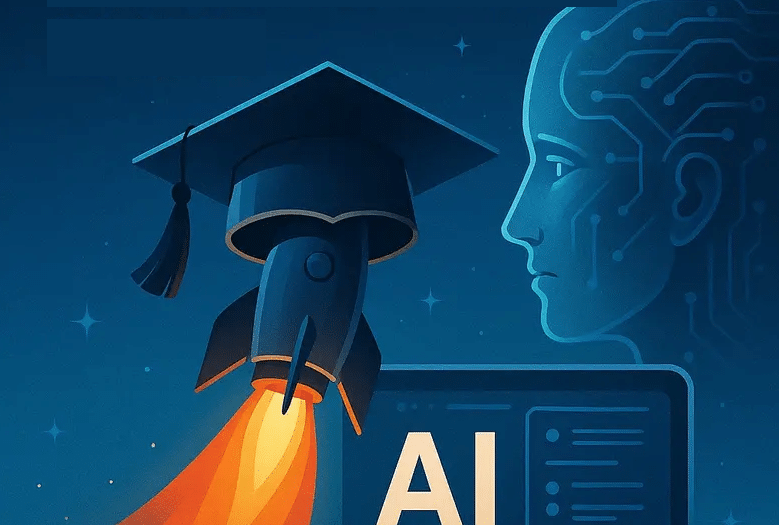Introduction: A New Era for Fresh Graduates
New graduates in 2025 are stepping into a job market defined not just by economic uncertainty but also by rapid innovation. Fortunately, they’re not entering alone. Artificial Intelligence (AI) is becoming the ultimate job-hunting co-pilot—reshaping everything from how graduates write their first resumes to how they match with employers across industries.
Whether you’ve just completed a computer science degree or a humanities major, AI tools are leveling the playing field and helping graduates land jobs faster, smarter, and with more confidence than ever before.
1. AI-Optimized Resumes: Tailoring Applications at Scale
Gone are the days of sending a generic CV to dozens of employers. AI-powered resume builders now help new grads tailor each application using real-time data. These tools analyze job descriptions and recommend personalized phrasing, keyword adjustments, and even formatting styles that increase ATS (Applicant Tracking System) compatibility.
Popular Tools:
- Rezi.ai: Automatically tailors resumes for different job titles.
- Jobscan: Compares your resume to a job post and offers match scores.
- Zety & Enhancv: Help create visually optimized resumes with performance-focused bullet points.
By aligning language with employer preferences, candidates can boost their chances of being shortlisted—even without prior job experience.
Hiring?
Post jobs for free with WhatJobs – Connect with innovative footwear technology professionals!
Post Jobs Now2. AI-Driven Job Matching: Beyond the Job Board
Modern job search platforms are moving past basic filters. AI now powers predictive job matching, learning from user behavior, qualifications, and preferences to recommend better-fit roles.
WhatJobs.com Example:
WhatJobs leverages smart filtering and AI-backed job alerts to match candidates with opportunities based on intent signals and past applications. This means more relevant listings and fewer wasted hours scrolling.
Why It Matters for Grads:
- Saves time: Instead of browsing irrelevant jobs, users receive targeted openings.
- Improves fit: Matches often consider soft skills, location, and growth potential.
- Boosts exposure: AI also helps employers discover you—if you have a well-structured profile.
3. AI Career Coaching: Personalized Guidance at Scale
Many graduates struggle with direction. Should they pursue marketing, project management, or UX design? AI-driven platforms now act like digital career coaches, analyzing personal strengths, interests, and academic history to suggest ideal paths.
Examples:
- LinkedIn Career Explorer: Uses skills and prior experience to show alternative careers.
- Eightfold.ai: Matches talent to job roles based on transferable potential.
- Google’s Interview Warmup Tool: Uses NLP (Natural Language Processing) to simulate interviews and provide feedback.
These tools democratize access to high-quality coaching once only available at top-tier universities.
4. Interview Prep and AI Mock Interviews
Interviews remain one of the most intimidating steps for fresh graduates. AI is reducing the anxiety by offering automated mock interviews that provide instant feedback.
Key Features:
- Speech pattern analysis: Detects filler words, tone, and pacing.
- Content analysis: Evaluates how clearly you answer behavioral questions.
- Body language coaching (in some apps): Uses webcam input to assess confidence and posture.
Try These:
- Yoodli: Practice interviews with real-time communication coaching.
- HireVue: Used by many employers for AI-recorded interviews—get familiar before it’s real.
For grads lacking interview experience, these tools provide critical preparation without needing human coaches.
5. AI-Powered Networking: Smarter Connections
Job hunting is often about who you know. AI-enhanced networking platforms help students identify key contacts, alumni, or recruiters to build meaningful professional relationships.
Tools & Strategies:
- LinkedIn AI Suggestions: Recommends connections and groups based on career interests.
- Handshake & Tallo: College-to-career platforms using AI to connect students with internships and jobs.
- GPT-based Email Writers: Help craft personalized yet professional messages to break the ice.
AI doesn’t just help you find a job—it helps you be found.
6. Skill Gaps? AI Knows What to Learn Next
Many new grads worry their skills don’t match industry demands. AI is bridging this gap with personalized learning roadmaps, recommending certifications, short courses, and tutorials based on your desired role.
Platforms to Explore:
- Coursera + Google AI: Suggests micro-credentials aligned with job postings.
- LinkedIn Learning: Auto-recommends skill paths based on career goals.
This data-driven upskilling empowers students to take ownership of their career trajectory—without spending years in more formal education.
7. Employer AI Tools: Why Grads Should Understand the Other Side
It’s not just job seekers using AI—employers are too. From AI resume scanning to predictive behavioral assessments, understanding how these systems work helps graduates stay ahead.
Key Points to Know:
- ATS (Applicant Tracking Systems) can reject resumes that lack key phrases.
- AI Video Interviews may evaluate tone, vocabulary, and even facial expressions.
- Skill Tagging Algorithms highlight your certifications or portfolio pieces to hiring managers.
By reverse-engineering what employers look for, you can tailor your materials to align better with AI evaluations.
Final Thoughts: AI Is Your Co-Pilot, Not Your Replacement
Some fear that AI will replace jobs, but for new graduates, it’s more accurate to say AI is replacing uncertainty. It’s giving students from all backgrounds the tools to navigate their career journey with confidence, clarity, and precision.
What matters most is how you use it—pairing AI’s power with your human curiosity, adaptability, and drive.




